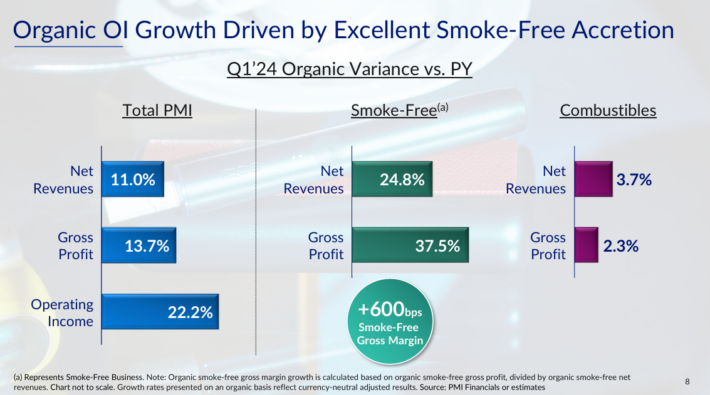Published on July 19th, 2024 by Bob Ciura
Tobacco stocks are particularly attractive to income investors, thanks to their generous dividends and defensive characteristics during economic downturns.
Tobacco companies produce a lot of cash, but have low capital expenditure needs, creating what could be considered ideal dividend stocks.
Philip Morris International (PM) has a high dividend yield of 4.9%.
As a result, it is part of our ‘High Dividend 50’ series, where we cover the 50 highest yielding stocks in the Sure Analysis Research Database.
You can download your free full list of all high dividend stocks with 5%+ yields (along with important financial metrics such as dividend yield and payout ratio) by clicking on the link below:
Tobacco stocks are widely prized by income investors thanks to their high dividend yields, stable payouts, and dividend growth.
This article will analyze the prospects of Philip Morris International in greater detail.
Business Overview
Philip Morris International is a tobacco company that was spun off from Altria (MO) in 2008. Philip Morris International sells cigarettes under the Marlboro brand, among others, internationally.
Its former parent company Altria sells the Marlboro brand (among others) in the U.S.
On April 23rd, 2024, Philip Morris reported its Q1 results for the period ending March 31st, 2024. For the quarter, the company posted net revenues of $8.8 billion, up 9.7% year-over-year.

Source: Investor Presentation
Adjusted EPS equaled $1.50, up 8.7% versus Q1 2023. In constant currency, adjusted EPS grew by a considerable 23.2%. Total shipment volumes were up 3.6% collectively, as growth in heated tobacco and oral products more than offset the modest decline in combustibles.
Specifically, shipment volumes in cigarettes, heated tobacco, and oral products were down 0.4%, up 20.9%, and up 35.8%, respectively. The Swedish Match buyout contributed strongly to the strong increase in oral products’ shipment volumes.
Management revised its fiscal 2024 guidance downward on a GAAP basis, but raised it on an adjusted basis. They now expect GAAP EPS to be between $5.70 and $5.82 (down from $5.90 and $6.02).
However, note that this outlook includes $0.43/share amortization of intangibles.
We apply the midpoint of management’s ex-currency adjusted EPS target, which was raised to $6.55-$6.67. Its midpoint implies a year-over-year growth between 9% and 11% and new record adjusted EPS (versus FY2023’s $6.01).
Growth Prospects
Heading in to 2024, PM had struggled to grow earnings for several years. For example, PM’s earnings-per-share were lower in 2023 than in 2020.
Currency rates are a major factor for Philip Morris’ profitability, as all the company’s revenues are generated outside of the United States.
Consequently, the strong U.S. dollar over the past several years has weighed on the company’s EPS growth due to unfavorable currency translation.
In addition, PM’s weak profit growth between 2018 and 2020 was also due to the company’s investments into the iQOS/Heatsticks technology.
The investment in the development and manufacture of the new devices on a massive scale were costly, but Philip Morris has already begun reaping the rewards of this investment.
Source: Investor Presentation
Ramp-up of iQOS/Illumina in international markets has boosted net income and expanded the margin mix.
We anticipate growth of 3% per year coming off $6.61 in EPS as a starting baseline. The recently acquired stake in U.K.-based Vectura, an inhaled therapeutics company, should also contribute to Philip Morris’ smoke-free growth plans.
The Swedish Match acquisition has already proven to be accretive earnings.
Competitive Advantages
In terms of a competitive advantage, Philip Morris has one of the most valuable cigarette brands in the world, Marlboro, and is a leader in the reduced-risk product segment with iQOS.
At the same time, the company’s massive scale allows for tremendous cost advantages. This means that Philip Morris is generally a low-risk business, with regulation being the exception.
Smoking bans can affect the company’s results, although Philip Morris is safer in this regard than many other tobacco companies due to its geographic diversification.
Dividend Analysis
With an annual dividend payout of $5.20 along with expected EPS of $6.61, PM has a projected dividend payout ratio of 79% for 2024. This is a bit high, but we believe the dividend is secure.
Philip Morris’ dividend payout ratio has never been especially low, and the ratio increased further during the last decade. At the peak, Philip Morris has paid out more than 100% of its net profits to its owners.
Due to strong cash generation, low capex requirements and the stability of Philip Morris’ business model during recessions the dividend remains relatively well-covered.
Final Thoughts
Philip Morris has kicked off fiscal 2024 on a strong note. The company posted strong growth in revenues and earnings, while management’s outlook points toward sustained momentum moving forward.
The addition of Swedish Match and heated tobacco products seeing increased adoption should continue to be favorable catalysts to earnings growth moving forward.
PM stock has a high yield of 4.9%, and the company has increased its dividend for 16 consecutive years. The dividend payout appears to be secure, at the company’s current level of earnings.
Overall, PM is an attractive dividend stock for income investors.
If you are interested in finding high-quality dividend growth stocks and/or other high-yield securities and income securities, the following Sure Dividend resources will be useful:
High-Yield Individual Security Research
- 20 Highest Yielding Monthly Dividend Stocks
- 10 Super High Dividend REITs
- 5 Highest Yielding Royalty Trusts
Other Sure Dividend Resources
- Dividend Kings: 50+ years of rising dividends
- Dividend Champions: 25+ years of rising dividends
- Dividend Aristocrats: 25+ years of rising dividends and in the S&P 500
- Dividend Achievers: 10+ years of rising dividends and in the NASDAQ
- Monthly Dividend Stocks: Individual securities that pay out every month
- MLPs: List of MLPs and more
- REITs: List of REITs and more
- BDCs: List of BDCs and more

